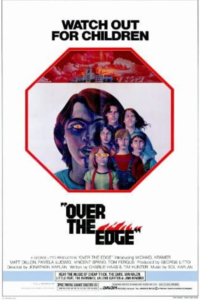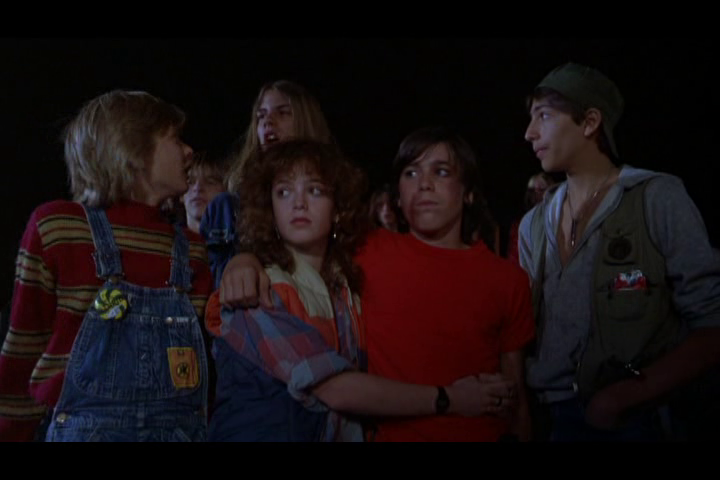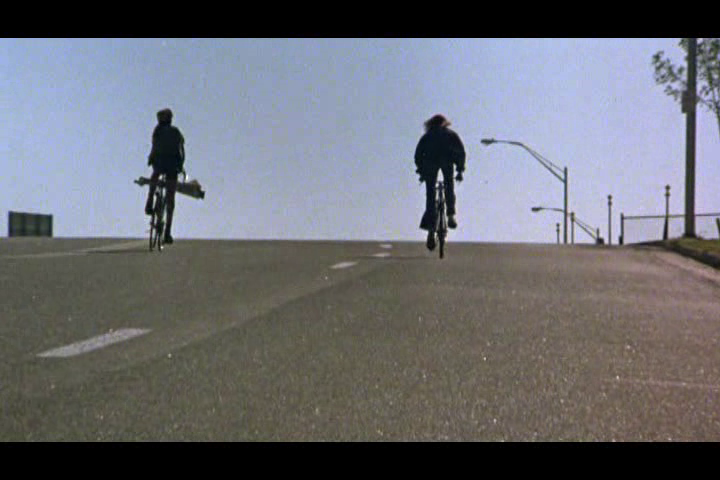Over the Edge (1979)
“When you’re 16, you start playing for real.”
|
Synopsis: |
|
Genres, Themes, Actors, and Directors:
Response to Peary’s Review: In Cult Movies 3, Peary discusses the film’s production and release history in greater detail, explaining that “after it received excellent reviews in such test markets as Chicago, Cincinnati, and Kansas City, it became almost impossible to see, sparking interest and word-of-mouth.” However, “since it was promoted as a horror(!) film” (see the movie poster above), Warner Brothers “shelved it”, defending “its decision with claims that no one would book a ‘gang picture’ after the heavily publicized incidents of violence at theaters showing The Warriors (1979) and Boulevard Nights (1979).” In addition, the “drug scenes” meant no network television stations were willing to air it, so “its audience would not grow until it turned up on cable more than a year later, began to play in repertory theaters, and became available on cassette.” Peary goes on to compare Over the Edge to Rebel Without a Cause (1955), noting that while “both films deal with the same subject, Over the Edge is more disheartening, indicating that it has gotten much worse for America’s youth since 1955″. Indeed, “Kaplan’s brutally realistic film” — a “terrifying warning — with no resolution — about what is happening to American’s best resource” — “makes Rebel Without a Cause seem optimistic.” Peary further associates Over the Edge with a handful of other films that are “completely in sympathy with teenagers”, including The Blob (1958), Foxes (1980), The Outsiders (1979), and The Breakfast Club (1986). Despite the ongoing issue of how to keep teens and pre-teens meaningfully engaged, when watching Over the Edge today one is definitely struck by how time-bound it feels: in the pre-internet era presented here, kids must gather physically somewhere in order to hang out — and as Peary writes, “they remind [one] of rats and other night creatures that come out when people are gone”, gathering “in the dark by the rec center, sitting on the ground or in little improvised hovels”. In “the party scene, their clutching bodies fill up the halls, the basement stairwell, and the basement of a house whose adult owners are away (it’s like an underground tunnel system inhabited by rodents)” — and “they run out of the house en masse as the cops arrive, as rats or roaches would do if the lights went on; they vandalize the school and like scavengers destroy and steal from the cars in the parking lot.” Indeed, while this film may be sympathetic to its teenage protagonists, it’s hard to actually like these characters, who are so damaged by their (privileged but insufficient) upbringing that violence and drugs seem to them to be their only option. Director Kaplan has stated, “I happen to believe these kids are potentially dangerous. A good demagogue comes along and he’s got his troops. And that scares the shit out of me.” Kaplan’s right to take this stance: these kids are dangerous, and one despairs for humanity when watching his depressing film. Redeeming Qualities and Moments: Must See? Categories
Links: |





4 thoughts on “Over the Edge (1979)”
First viewing. Not must-see.
I don’t doubt that this film is “based on similar real-life occurrences”. Nor do I doubt what may have been some real concern (on the part of those behind the camera) about this perceived societal dilemma.
My real issue with the film is that I find it largely (even if unintentionally) irresponsible, rather lazy and ill-defined in scope overall and guilty of fetishizing teen rebellion. Taken on its presentational, plotless surface, it makes little sense. Because…
– Why does this particular community exist in the first place?; wildly isolated and culturally lacking in a way that defies understanding.
– If the parents in this community were largely concerned about protecting their kids, wouldn’t they be just as conscious of spending more time with them? And why don’t they do that when there’s precious little else to do in the town, anyway? How else would they spend their nights?
– We really only see two sets of parents in action (and they seem rather normal) so what’s with the rebellion re: home life?
– We see just about no other interrelations with other adults so, again, viewers don’t know what is justifying the teen anger.
– Why is it that seemingly 99% of the teens in this community are rebellious? (And what’s with that one classroom scene in which all of the students are genuinely being model students, seeming to wonder what all the rebellion talk is about?) And are they rebelling against middle-class life that apparently has them fed and clothed and with money to get high? Why is boredom something to rebel against?! Cripes! Read a book, kids! Get your heads out of your navels! To me, these kids are not “an interesting lot”. I was soon bored myself, listening to their idiotic babbling.
– Why is there only one active policeman on-duty? (It seems, when the town was in real trouble, outside police had to be brought in. Because they certainly weren’t around through the whole movie.)
– Why does the literally explosive last 15 minutes come off like the only reason the film was made, to have a big, violent finish?
… I could go on. Again, I’m all for a film that will intelligently present its case when it comes to a pressing social problem. I just don’t think this film does that.
A must see.
I was literally 15 when this film came out, but I saw it a few years later (but I was still close to this age group). This was my existence. Listen to Cheap Trick and the Ramones, skateboard, smoke (more of a fake for me), rebel, try to be cool around the “girls.” Now…I also got decent grades. Played sports As did a lot of people. Not of this was depicted. This just shows one subset as if it was the entire set.
Yes…some logic has to be thrown out of the way, but literally my community had decent homes with nothing to do other than hang out and walk and bike around. We literally had a few police, but not enough for the entire planned community. And yes, that is what it was. A community outside the city with homes, a convenient store, a rec center outside a church for youth, and a lot of despondent latch key kids.
This film seemed real to me back then. It seemed authentic. As an adult, I don’t find it as interesting, but that may be due to knowing it by heart.
For the subject matter, young cast, and time frame, I do call it a must see for a decent slice of life of that era for this segment of population.
Plus…a soundtrack that sort of defined my youth.
This film and “Dazed and Confused” seemed to be written about me!
I’m really enjoying this conversation here, and will add my two cents about relating to the film (or not).
I was a hugely independent teenager, going my own way (including dropping out of school), reading a lot, and mostly befriending adults – so I don’t see myself echoed here in terms of the need to join a group of peers. But oh boy, does that ever seem like the norm for most – including, for instance, my younger sister (who obsessively watched “Dazed and Confused” as a cult flick years ago and similarly felt like it mirrored her existence).
As a parent and educator, I am concerned about whether an environment is providing enough for kids to do. Reading is (of course!) great, but not for everyone, and usually not sufficient.
This film scares me, like director Kaplan notes, because the lure of group-think by either legitimately or self-perceptively disenfranchised individuals is all-too-real (ahem).
It’s not particularly realistic (or three-dimensional) in terms of being told exclusively from the point of view of the kids; but then again, the world as told by teenagers is a pretty darn skewed world.
Interesting thoughts. Agree that this film (and to a lesser extent…”Dazed and Confused”) offer concerns about a segment. While “Dazed and Confused” showed Linklater’s view point about a bunch of jocks, brains, and burnouts hanging out together, “Over the Edge” showed group think mentality as a fatal outcome.
Completely one-dimensional, yet there were some valid points of some trends where parents thought moving to a community like New Grenada (if I’m remembering the correct name) would instantly allow safe tranquility while treating the home like an investment. Some of the less successful parts of the film involved the H.O.A. / real estate investment person who was merely concerned with property values.
This little cult film merits discussions. I put it in a group of one-dimensional films like “Massacre in Central High”, “Pump Up the Volume” and even “Rebel Without a Cause.” I find of of these films a must see, but they also all offer less than well round exposes of teenagers of all ages.